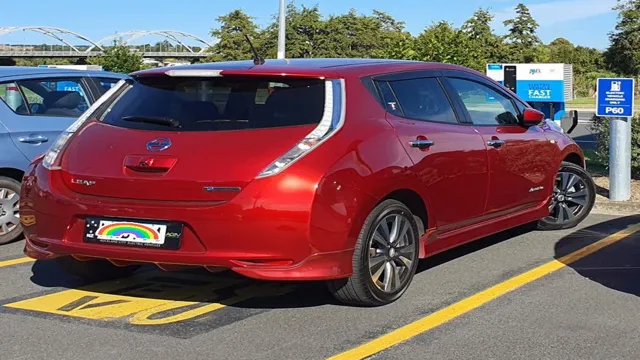From hybrid cars that run on gasoline and electricity to all-electric cars that run solely on electricity, EV cars (Electric Vehicle cars) have quickly become one of the most popular forms of transportation in the world. With their sleek designs, low emissions, and lower operating costs, EV cars offer a variety of benefits that make them a great choice for anyone looking to reduce their carbon footprint and save money. In this blog, we’ll discuss what makes EV cars so great, how they work, and how you can get your hands on one.
Read on to learn more about this exciting new form of green transportation.
The Basics of an EV Car
When it comes to electric vehicles (EVs), there is a lot of talk about the future of transportation and the potential they offer. But what is an EV car and how does it work? This article will provide a brief overview of the basics of an EV car and explain how it differs from traditional gasoline-powered cars. An EV car is one powered solely by an electric motor.
This motor runs on electricity stored in a battery pack, which is located under the car floor. When the driver wants to move the car, the battery sends a charge through the motor, which then drives the wheels. This eliminates the need for a combustion engine, which traditionally generates power in a gasoline-powered car.
The electric motor of an EV car is more efficient than a combustion engine, as it does not have to burn fuel to generate power. This means that an EV car is more environmentally friendly, producing fewer emissions and using less fuel. Additionally, electric vehicles tend to be quieter than their gasoline counterparts, as they don’t require the same loud ignition and exhaust system.
The biggest advantage of an EV car is its low running costs. As electricity is much cheaper than gasoline, owners of an EV car can save money on fuel costs. Additionally, electric vehicles require less maintenance than gasoline-powered cars, meaning that their overall cost of ownership can be lower.
Although electric vehicles have numerous advantages, they also have some drawbacks. The biggest issue is their range. Most electric vehicles can only travel a limited distance before needing to be recharged, meaning that they may not be suitable for long journeys.
Additionally, the cost of purchasing an EV car is often higher than for a gasoline-powered car. Overall, electric vehicles offer many potential benefits, including lower running costs, less maintenance and fewer emissions. However, there are also some drawbacks, such as limited range and higher upfront costs.
Types of EV Cars
Electric vehicles (EVs) are becoming increasingly popular, due to their efficiency, sustainability, and cost savings. An EV car is a vehicle that is powered solely by an electric motor and battery, instead of combustion engines that rely on gasoline or diesel fuel. EVs don’t produce emissions and are much quieter than traditional vehicles.
They are also much more efficient, with some models offering over 300 miles on a single charge. EVs have become more accessible and affordable than ever before, with many models available in a wide range of prices and styles. With so many options, there’s sure to be an EV car that fits your lifestyle.

Benefits of an EV Car
Electric Vehicles, or EVs, are becoming increasingly popular as an alternative to gasoline-powered cars. They offer a host of benefits, from lower fuel costs to fewer emissions. An EV car is powered solely by electricity, meaning it runs on a battery, as opposed to burning gasoline and producing pollution.
This makes EVs environmentally friendly, and they are often cheaper to run in the long term. EVs also tend to have better acceleration than gasoline cars due to instant torque, making them great for city driving. Additionally, many cities are now offering incentives for the purchase of EVs, making them a great choice for those looking to go green.
Costs of an EV Car
The cost of owning an EV car can vary greatly depending on the model you choose. While electric vehicles (EVs) can be more expensive upfront than traditional gas-powered cars, they are often cheaper to maintain and come with other long-term benefits. EVs typically cost less to operate since they have fewer moving parts and use electricity instead of gasoline, resulting in lower fuel and maintenance costs.
Moreover, depending on where you live, you may be eligible for federal and/or state tax incentives and credits, allowing you to save money on the purchase of an EV. Additionally, many cities and states have additional incentives and programs that may help offset the cost of owning an EV. Ultimately, the cost of owning an EV will depend on the model you choose and where you live.
Comparing EV Cars
What is an EV Car? An EV car, or electric vehicle, is a vehicle that is powered solely by electricity. EV cars have become increasingly popular in recent years as advances in technology have made them more viable options for everyday commuters. Unlike gasoline-powered cars, EV cars do not require the combustion of fossil fuels, thus resulting in zero emissions.
The electricity needed to charge an EV car can come from renewable sources such as solar, wind, and hydroelectric power, making them an environmentally-friendly option for those looking to lower their carbon footprint. EV cars come in a variety of shapes and sizes, from compact hatchbacks to large SUVs. They can range from being fully electric to having a range extender, meaning that they are powered by a combination of electricity and gasoline.
Electric vehicles can also be classified into two categories: pure electric and hybrid electric. Pure electric vehicles, such as the Tesla Model 3, run solely on electricity, while hybrid electric vehicles, such as the Toyota Prius, have both a gasoline engine and an electric motor. Electric vehicles offer many advantages over traditional gasoline-powered vehicles.
They are much quieter than gasoline-powered cars, resulting in a more peaceful driving experience. EV cars also tend to require less maintenance than their gasoline counterparts since they have fewer moving parts and no need for oil changes. Additionally, electric vehicles are typically more efficient, meaning that they can go further on a single charge than gasoline-powered cars.
The main disadvantage of electric vehicles is the cost. Although EV cars have become more affordable in recent years, they still tend to be more expensive than their gasoline-powered counterparts. Additionally, EV cars can take much longer to charge than filling up a tank of gas, making them less convenient for long trips.
Overall, electric vehicles offer a number of advantages over gasoline-powered cars. They are cleaner, quieter, and more efficient, making them an excellent option for those looking to lower their carbon footprint. With advances in technology and decreasing costs, electric vehicles are becoming a viable option for more and more people.
Features of Different EV Cars
Electric vehicles (EVs) are an eco-friendly transportation option that are becoming increasingly popular. EVs are powered by electricity instead of gasoline, meaning they produce no emissions and are much more efficient than traditional gasoline-powered cars. EVs are available in a variety of shapes and sizes, ranging from small hatchbacks to large SUVs.
They typically have longer ranges, faster acceleration and braking, and better handling than gasoline-powered cars. Additionally, many EVs come with a variety of features such as heated seats, advanced safety systems, and even wireless charging capabilities. With their many benefits and features, EVs are becoming an attractive option for those looking for a more environmentally-friendly alternative to gasoline-powered vehicles.
Pros and Cons of Different EV Cars
Electric vehicles (EVs) have been gaining in popularity in recent years, and it’s no surprise why. EVs offer an array of benefits such as reduced emissions, lower fuel costs, and even tax credits. But before you make the switch to an EV, it’s important to understand the pros and cons of different EV cars.
Knowing what to expect can help you make an informed decision and find the perfect vehicle for your needs.
Cost Comparison of Different EV Cars
Are you looking to make an informed decision about the best electric vehicle (EV) car for you? It’s important to compare costs when purchasing an EV car to ensure you’re getting the most bang for your buck. In this blog section, we’ll explore the cost comparison of different EV cars, so you can make an informed decision on the best car to fit your needs. We’ll compare prices, features, and other costs associated with owning an EV, so you can find the perfect car that’s both affordable and functional.
Conclusion
EV cars are a revolutionary form of transportation that offer numerous benefits. They are powered solely by electricity, resulting in lower emissions, quieter operation, and lower operating costs. EV cars come in a variety of types, from all-electric models to hybrids that combine electricity and gasoline. They offer features such as improved acceleration, lower maintenance requirements, and incentives and tax credits.
While there are some drawbacks, such as limited range and higher upfront costs, the overall advantages of owning an EV car make them a great choice for those looking to reduce their carbon footprint and save money in the long run. As technology continues to improve and costs decrease, EV cars are becoming an increasingly viable option for people around the world.
Frequently Asked Questions
How does an EV car work?
An EV car is powered by an electric motor that runs on electricity stored in a battery pack. When the driver wants to move the car, the battery sends a charge through the motor, which then drives the wheels. This eliminates the need for a combustion engine and reduces emissions.
What are the benefits of owning an EV car?
Some benefits of owning an EV car include lower fuel costs, reduced emissions, lower maintenance costs, and potential tax incentives. EV cars are also quieter and offer better acceleration.
Are EV cars more expensive to purchase?
Generally, EV cars are more expensive upfront compared to gasoline-powered cars. However, they often have lower operating and maintenance costs, which can offset the higher initial purchase price. Additionally, there may be government incentives and tax credits available to help reduce the cost of an EV car.
How does the range of an EV car compare to a gasoline car?
The range of an EV car can vary depending on the model, but it is generally more limited compared to a gasoline car. Most EV cars can travel around 200-300 miles on a single charge. However, the range of EV cars is improving with advancements in battery technology.
Can I charge an EV car at home?
Yes, most EV cars can be charged at home using a standard electrical outlet or a dedicated EV charging station. It typically takes several hours to fully charge an EV car, depending on the battery size and charging speed.

I am James Beaupre, the founder of batteryvehicleprice.com. With a deep-rooted passion for vehicle batteries, I have dedicated my career to exploring and understanding the intricacies of this crucial technology. My website aims to provide valuable insights and information on battery-powered vehicles, empowering individuals to make informed decisions.
